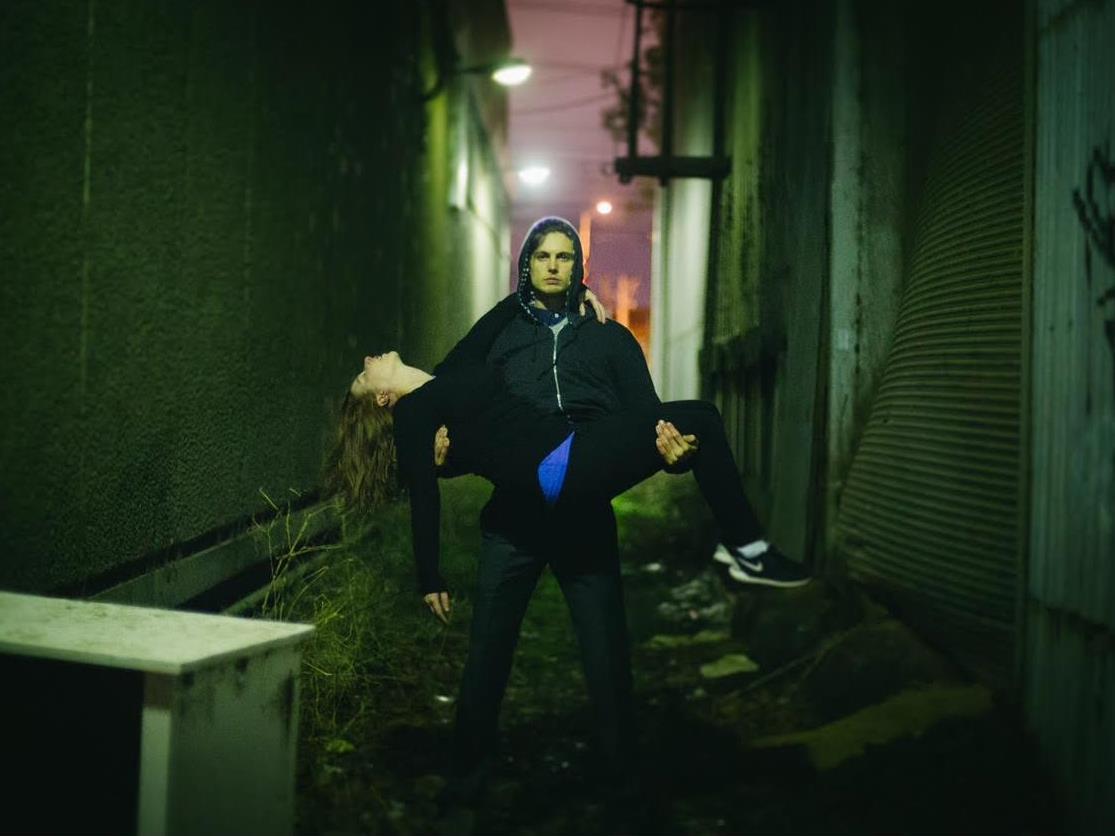Photo courtesy of Rebekah Kamsky.
When sitting in the backseat of the Honda Jazz for this nocturnal ride, the twitching sound of the green indicator transforms into a momentous sign that something significant is about to happen. Mysterious figures appear and disappear on the street, they might be fantastically or ordinarily dressed and regularly cross paths with pedestrians. They cannot be told apart: reality and surreality merge. The car stops in a dark alleyway and through the back window that has become a moving stage the viewer gazes, quite uncomfortably, into the private life and eyes of a seemingly unhappy, working-class couple, like in a bleak, Richard Billingham depiction of family life, where the domestic is made uncanny. But the inhabitants of Suburbia look right back and just when you think you are safe, the backdoor of the car opens.
Off the highway, through the alleyways of suburban Melbourne, the car windscreen becomes the eye of a moving camera, offering some powerful and almost cinematographic stills of abandoned parking lots and haunted factories: a powerful enactment of the surrealist belief that the underbellies of cities are the setting for a chance encounter with the marvellous.
Alleyways can be dirty, unsafe, pitch-dark. One is left to imagine, in director Davina April Wright’s own words, that the ‘black shiny lumps on the side of the road’ are ‘bodies in garbage bags’. Yet it is precisely because of this base materialism that alleyways convey and because of their proximity with human life in general, that they are also the stage where the play of human existence reaches its most dramatic moments. The driver stops, lights on, the front seats transform into a small private stage and an alluring female narrator speaks of sexual desire for her mother, hence for herself, in a clear reference for the narcissistic or reflective phase in the development of one’s ego. April Wright, in an effortless and visionary interpretation, pulls out from the magic car a gigantic cookie and starts eating it; the voice, the cookie, the tactile crunch of childhood recollections merge into a fantastic, yet intimately present image, that seizes all the senses, while allying the sexual and the edible, voracity and desire.
The electronic music of Simone Gustafsson, with its deep and sharp beats allies the dreamlike with a road-trip style soundtrack to enrapture the ears, while the vision of the suburbs is altered by the performed collection of dramatic fragments.
But human life could also take a sinister turn. Depending on where the journey takes you, the suburbs might become the setting of urban violence and abuse. Suburbia is exceptional in keeping the spectator constantly within and without the performance, while the wondering drive generates the feeling of a freedom by night: thoughts, visions and realities that are forbidden in the daylight, or in the limited space of a traditional theatre, expand in the world of Suburbia. The most powerful thought that we are left with is that such a world takes place within our real world, from being spectators we might become actors. The performance is about travelling outward, getting lost in the meanders of our suburban life, as well as deeply inward, within the human condition, in the stories of each driver and travelling companion that share the intimate space of the car.
Rating: 4 stars out of 5
Writer / Director Davina April Wright
Producer Xavier O’Shannessy
Soundtrack composition and design Simone Gustafsson
Costume Design Ross de Winter Performed by: Cazz Bainbridge, Anneli Björåsen, Carolyn Butler, Xavier O’Shannessy, Claudia Nugent, Ross de Winter, Davina April Wright
Melbourne Fringe Festival
Presented by Gold Satino, Melbourne Independent Theatre and Performance Art Collective
18 September – 03 October 2015





